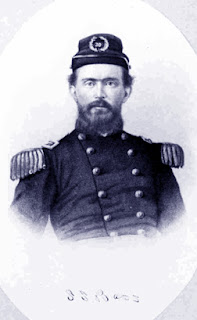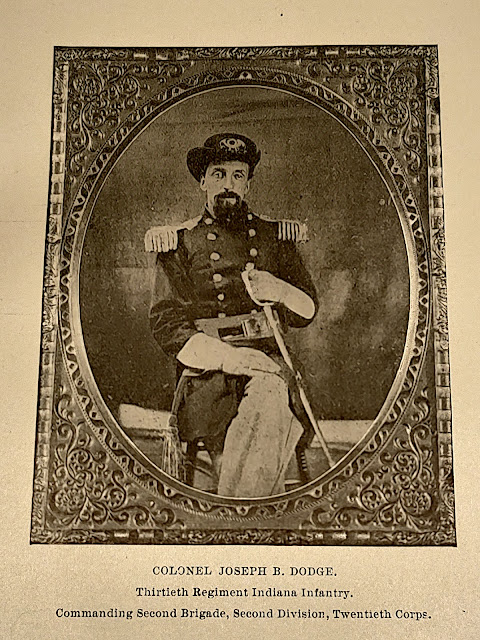I Could Not Ride Without Stepping On the Bodies: A Hoosier Colonel at Shiloh
It was three weeks after the Battle of Shiloh before Lieutenant Colonel Joseph B. Dodge of the 30th Indiana had time to give his wife a hurried account of the engagement. He struggled to find the words to describe what he saw. "You can have no idea of the awful slaughter that took place," he wrote. "There were actually places where you could walk (had you been so inclined) 30 rods straight ahead on the bodies of dead Rebels. In one place I saw them so thick one quite a large piece of ground that I could not ride through on account of my horse stepping on them. I got off wonderfully: a Minie ball cut the hair off the back part of my head, another went through one of the men and struck me on the calf of my leg doing no damage further than making it feel as if somebody had thrown a stone and hit me. A buckshot went through my pants close to my knee."
Colonel Dodge numbered among the lucky ones: the 30th Indiana lost 129 officers and men in the fight including Colonel Sion S. Bass who was mortally wounded. Indiana at Shiloh explains how the 30th Indiana arrived on the battlefield on the morning of April 7, 1862. "On the morning of April 6th when many miles from Savannah, the roar of cannon from the battlefield of Shiloh could be plainly heard. At 11 o'clock at night the regiment arrived at the river and soon boarded a steamer for Pittsburg Landing where it arrived at 6 o'clock on the morning of April 7th. It was ordered with its brigade to the firing line and went to the front and right center of the army at 10 o'clock where it was in line of the reserve on the right of General Rousseau's brigade. The ground occupied was the vital position and it belonged to him to hold the road to the landing. The position was many time furiously assaulted and each flank movement of the enemy was defeated with heavy loss," it stated.
"After Rousseau's brigade had been under a furious fire for some length of time, it was relieved by the Fifth Brigade commanded by Colonel Kirk. It advanced and gained a position known as Woolf Field at the right of Water Oaks Pond and moved across an open field in its front. At this point, the regiment became again seriously engaged with the enemy. The Rebel artillery, located on a commanding ride to the right, left, and center poured forth a terrific fire of shot and shell, inflicting fearful slaughter. The 29th Indiana now took position on the extreme right to guard against another charge of the enemy while the new lines were being formed. At this point, Colonel Sion S. Bass fell mortally wounded, pierced by a musket ball, and was carried off the field. Lieutenant Colonel Joseph B. Dodge now assumed command of the regiment. A forward movement was made and the 30th, some distance in advance of its line, planted its colors and the whole line rushed onward with determination to advance. The enemy tried to crush the center of the Federal lines and thus gain the essential step to victory, but was driven back with great slaughter and pursued some distance by the regiment."
Colonel Dodge's letter first appeared in the May 8, 1862 edition of the Northern Indianian published in Warsaw, Indiana.
Battlefield near Pittsburg Landing, Tennessee
April 26, 1862
My dear wife,
I wrote you a
few lines the other day in order to let you know that I had escaped without injury
and was well. I presume that you received a telegraphic dispatch the day after
the fight, however, so that you were not uneasy. I hope you did, as I sent one
the first opportunity I got.
I cannot write
any particulars but it is without doubt the greatest battle that has ever been
fought on the continent. On Sunday, our forces were completely whipped and if
General Buell’s force had not come up just as they did, they would have been
captured or driven into the river every one of them. We got here about daylight
on Monday morning and were immediately marched out to the front in the center
of our line. Our division (McCook’s) stood the heaviest of the fighting all day
and our brigade (the 5th) consisting of the 29th and 30th
Indiana, the 34th Illinois, and the 77th Pennsylvania,
stood under the most tremendous fire from three Kentucky and two Mississippi
regiments for two hours and finally drove those who were left into a retreat.
We were just out of ammunition when they broke and there is no telling what the
result would have been as we could not have held out ten minutes longer.
 |
| Colonel Sion S. Bass 30th Indiana |
We took Colonel Joel Battle of the Mississippi Tigers prisoner , and he says that there were not 50 men of his regiment left and the ground showed it to be true. [The 50-year-old Battle was actually colonel the 20th Tennessee and was captured looking for his two sons.] You can have no idea of the awful slaughter that took place. There were actually places where you could walk (had you been so inclined) 30 rods straight ahead on the bodies of dead Rebels. In one place I saw them so thick one quite a large piece of ground that I could not ride through on account of my horse stepping on them. They lost in killed more than two to our one, but we had a great many the most wounded owing to the difference in our way of fighting. Our men stood up to it but laid down on the ground and got behind trees. It is impossible to tell whether there will be any more fighting or not. I am inclined to think there will not.
We shall leave here to follow
them up as soon as the roads get so that we can get over them as they are very
bad now owing to the heavy rains since the battle. I got off wonderfully: a
Minie ball cut the hair off the back part of my head, another went through one
of the men and struck me on the calf of my leg doing no damage further than
making it feel as if somebody had thrown a stone and hit me. A buckshot went through
my pants close to my knee. Colonel Sion Bass is very badly wounded and was taken
from here to Louisville where Mrs. Bass will meet him and stay until he is able to be taken home which I hope will be soon. Major Orrin Hurd had his horse shot
from under him. We lost 12 killed, 110 wounded, and two missing. The boys stood
up like heroes and all say that although they have no desire again for as big a
fight, they are ready to do it over again.
J.B. Dodge
Sources:
Letter from Lieutenant Colonel Joseph B. Dodge, 30th
Indiana Volunteer Infantry, Northern Indianian (Indiana), May 8, 1862,
pg. 2
Coons, John W., complier. Indiana at Shiloh: Report of the Commission. Indianapolis: William B. Burford, 1904, pgs. 117-121











Comments
Post a Comment